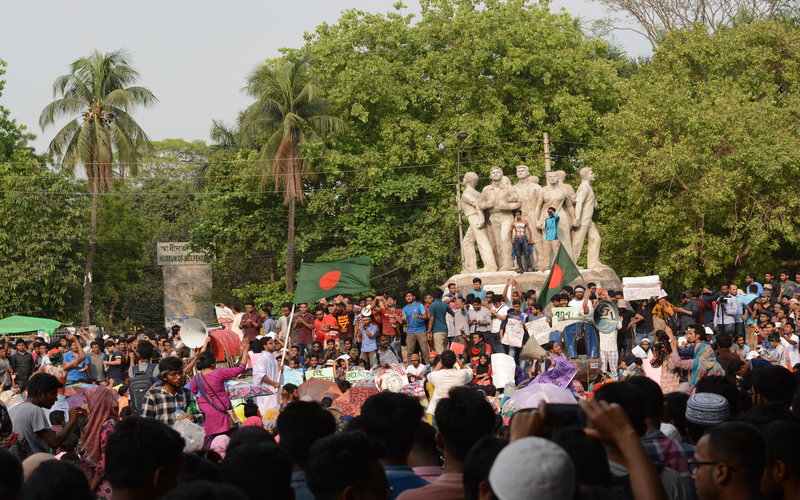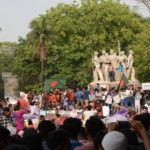Over a hundred people were injured across Bangladesh in clashes after students staged protests to demand reformation of quotas in the public recruitment sector. The violence erupted in Dhaka University on Sunday evening and continued into the early hours of Monday, causing protests to spread in public universities across the country and many private universities as well. The residence of DU vice-chancellor was vandalised by masked men. On Monday afternoon, protest leaders announced a one-month break after officials agreed to review the quota system. But soon the agreement was rejected by a section of the protesters, who issued an ultimatum for their five-point demand to be met by April 15. Finally, to cap it all off, the two factions of protesters reunited, giving the movement a new boost.
These are hard, irrefutable facts about the last three tumultuous days in the country’s education sector. But there are also insinuations trudging along the facts. So you have ruling party leaders blaming the violence on BNP-Jamaat (they called the movement a “conspiracy” against the government). You have Agriculture Minister Matia Chowdhury delivering a fiery speech against the protesters in parliament, using unparliamentary language. You have detractors trying to discredit the movement by citing the VC incident. All these suggestions can be viewed as a knee-jerk reaction to what is clearly one of the biggest protests faced by this government.
But was this really unpredictable? Sunday’s incident marks the culmination of years of protests held by the jobseekers. The violence, while largely a law enforcement failure, is also a reflection of the popular resentment brewing against the quota system. The students are growing restless by the day because no government, for example, would take the “unpopular” decision of slashing quota for the descendants of Freedom Fighters, the bone of contention in the quota issue. Why are the students so desperate now? One video clip that went viral shows a student offering an emotional account of how depression resulting from unemployment is affecting the youth. “Some of them, frustrated with the outcome of their BCS [Bangladesh Civil Service] endeavours, have no way but to contemplate suicide. You can shoot them but what do they have to lose? Ashamed of their failure to secure a job, many haven’t visited their families for 4-5 years,” he said. Another picture shows a lone protester bravely facing a group of armed policemen. His desperation couldn’t be more palpable.
But even if the students had a role, however distant, in the escalation of violence, a sociological assessment will have linked it to the fact they have suffered for too long because of an unjust quota system, and through its failure to address it more judiciously, the government has rather paved the way for it to happen.
But these same students, decried by the political establishment, showed remarkable restraint in the initial phase of their latest protests. One picture that also went viral on social media shows a group of peaceful protesters approaching the police with flowers. It happened on Sunday, before violence had erupted. Such indulgence in a spirit of bonhomie by a protesting crowd is unheard of. But when large numbers of people join forces for a cause, things tend to slide out of control at times. So if there was an unexpected turn of events in the later phase of the protests, it was because the students are not a homogeneous group that would react in the same way should a situation arise. From a sociological point of view, however, when a grievance is suppressed for too long, deviance and even violence can be a natural outcome.
French sociologist Émile Durkheim, in his labelling theory on deviance, said that all forms of deviance are simply a challenge to the “normalised repressiveness of the state.” Durkheim was the first person to suggest that if there’s something wrong with our society, then criminality is a response to that. Did the students turn violent at any stage of the ongoing protests? Maybe they did, maybe they didn’t. Media reports have linked the police and BCL activists to the eruption and escalation of violence. The DU VC, on his part, has also expressed doubts whether those who attacked his residence were students. But even if the students had a role, however distant, in the escalation of violence, a sociological assessment will have linked it to the fact they have suffered for too long because of an unjust quota system, and through its failure to address it more judiciously, the government has rather paved the way for it to happen. It is probably because of this situation that those faceless criminals behind masks were able to take advantage of the chaos that followed the protests.
What happens when the powers that be fail to address people’s legitimate grievances? In the words of WB Yeats, “A terrible beauty is born.” And it is the people who always emerge victorious in the long run.
There is, however, no denying the importance of affirmative action in the job sector. The protesters know that as well. Some form of a quota system should be there to favour those who tend to suffer from discrimination, but what we have now is a totally outdated and irrational one. The system as it stands now will hold us back going forward, especially in meeting the challenges of SDGs for which we need qualified manpower, people recruited on the basis of their merit.
The government, for all intents and purposes, has two options now: either convince the agitating students of its sincerity to meet their logical demands—which include reducing the quota privilege to 10 percent from the existing 56 percent—and act on them, or face the prospect of a prolonged crisis in the public sector, not to mention a faceoff with the youth that may get blown out of proportion if left unaddressed. Should the government decide to follow the first option, it may find solace in the fact that it will be correcting a major policy mistake. In the past few days, amidst all the din and noise, the best argument in favour of reforms was given by a student named Hasan Al Mamun, leader of the student group behind the demonstrations. Talking to AFP, he said: “These quotas are discriminatory. Due to the quota system, 56 percent of the jobs are set aside for five percent of the country’s population. And 95 percent of the people can compete for the 44 percent.” The government, in the event that it makes the right call, will be doing the 95 percent justice.
What happens when the powers that be fail to address people’s legitimate grievances? In the words of WB Yeats, “A terrible beauty is born.” And it is the people who always emerge victorious in the long run. A continuation of the heavy-handed approach thus far taken by the law enforcement officials to suppress the student movement may have catastrophic consequences for the government. Are we ready to face such a possibility?











